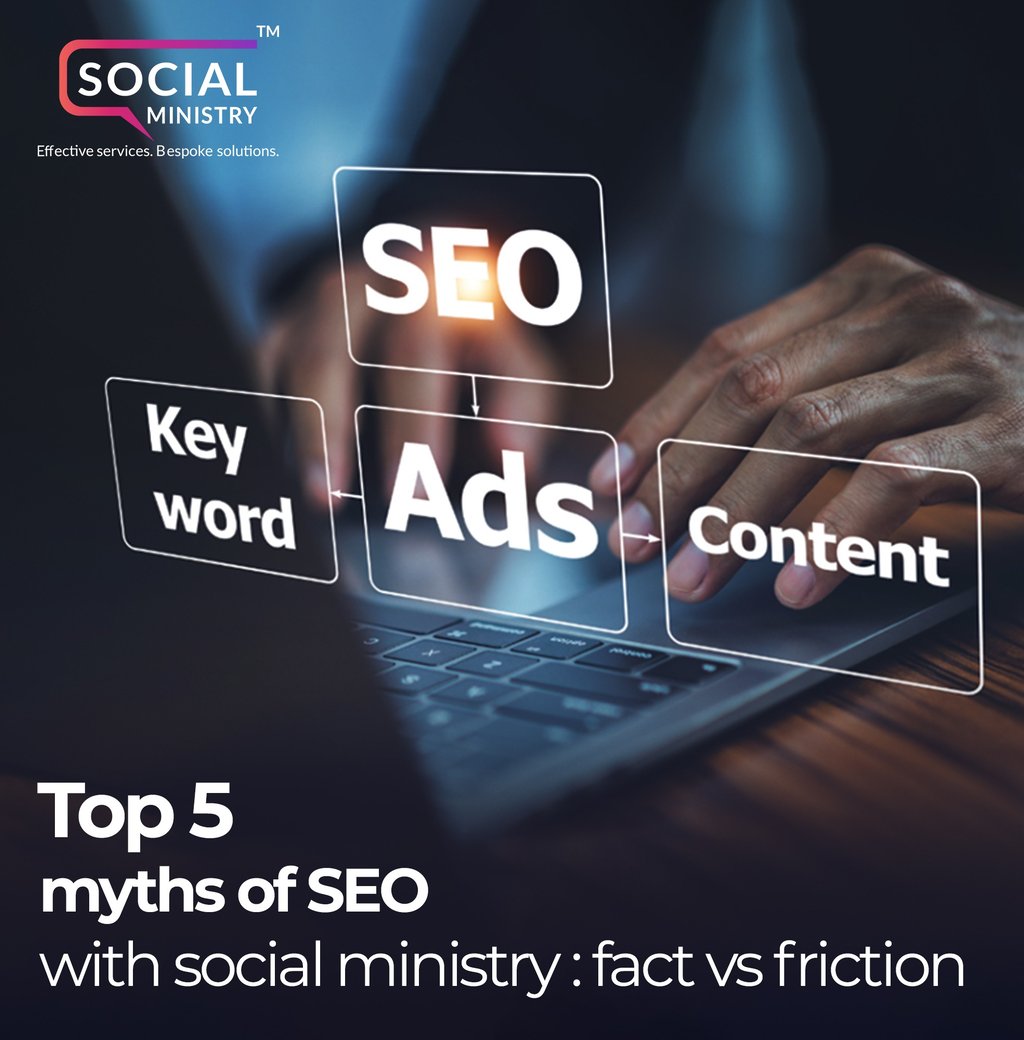Top 5 myths of SEO with social ministry: fact vs friction
11/21/20242 min read


When it comes to improving your website’s visibility, Search Engine Optimization (SEO) is essential. However, in a world of ever-changing Google algorithms and a flood of conflicting advice, many SEO myths continue to circulate. Falling for these misconceptions can lead to wasted time, missed opportunities, and even harm to your site’s performance.
Picture this: you’ve spent hours tweaking your website, stuffing it with keywords, and obsessively tracking every bounce rate, convinced you’ve unlocked the secrets of SEO. Yet, your rankings stubbornly refuse to improve. Sound familiar?
The truth is, outdated practices like keyword stuffing and chasing low-quality backlinks no longer work in today’s SEO landscape. Instead, modern SEO focuses on user experience, high-quality content, and technical optimization.
In this blog, we’ll expose some of the most common SEO myths, revealing actionable strategies to improve your organic rankings. Get ready to ditch the misconceptions and embrace techniques that genuinely drive results!
1. Myth: SEO is a One-and-Done Task
Some believe optimizing a website once is enough to maintain visibility.
Reality: SEO is an ongoing process. Search engines like Google frequently update their algorithms, and your competitors are always evolving. To stay ahead, you must continuously update content, monitor performance, and adapt your strategy.
2. Myth: Keyword Stuffing Improves Rankings
Overloading pages with keywords might seem like a good idea.
Reality: Keyword stuffing not only fails to improve rankings but can also result in penalties. Google prioritizes content that is relevant, natural, and user-friendly. Use keywords strategically, but always write with your audience in mind.
3. Myth: Running Ads Boosts Organic Rankings
Does spending on ads improve your organic search performance?
Reality: Google Ads and organic rankings are separate entities. While ads can drive immediate traffic, organic growth depends on SEO best practices like high-quality content, technical SEO, and backlinks from authoritative sites.
4. Myth: Meta Tags Don’t Matter Anymore
Some claim meta tags no longer affect SEO.
Reality: While meta descriptions don’t directly impact rankings, they influence click-through rates, which can indirectly improve visibility. Title tags, however, remain a direct ranking factor and should include your primary keywords.
5. Myth: SEO Guarantees Instant Results
Can you expect overnight success with SEO?
Reality: SEO is a long-term investment. Depending on competition and industry, it may take weeks or even months to see significant improvements. Stay patient and consistent with your efforts.
Avoiding Myths: Focus on What Works
Believing in SEO misconceptions can lead to wasted time and effort. Instead, focus on proven strategies:
● Publish high-quality, relevant content regularly.
● Build authoritative backlinks from reputable sources.
● Optimize your site for mobile and improve page speed.
● Stay informed about the latest SEO trends and algorithm updates.
Effective SEO is about strategy, not shortcuts. Avoid myths, prioritize high-quality content, and stay updated on best practices. Success comes with consistent effort and delivering value to your audience.
Ready to elevate your website’s SEO?
Contact us today for tailored strategies that deliver real results!
For more information visit: https://www.socialministry.in/
Let's discuss a project
Let's Grab a Coffee
Phone
+91 6357 888 555
Socials
Integrated Advertising Gujarat | Integrated Advertising Ahmedabad | Integrated Advertising India | Ad Agency in Ahmedabad | Ad Agency in Gujarat | Ad Agency | Branding Agency in India | Integrated Advertising Ahmedabad | Digital Advertising Agency Ahmedabad | Social Media Agency in Ahmedabad | Social Media Agency | Digital Marketing Agency | Digital Marketing Ahmedabad | Creative Marketing Agency in Ahmedabad | 360-Degree Marketing Solutions I Full-Service Advertising Agency I 360-Degree Marketing Solutions in Ahmedabad I Real Estate Marketing Ahmedabad I SEO Agency Ahmedabad
